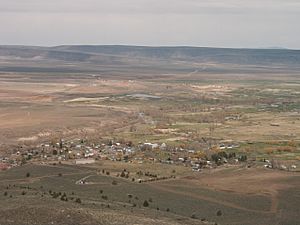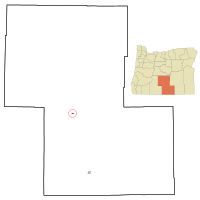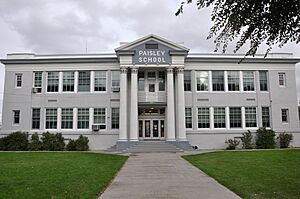Paisley, Oregon facts for kids
Quick facts for kids
Paisley, Oregon
|
|
|---|---|

Aerial view of Paisley, 2008
|
|
| Motto(s):
Home of the Mosquito Festival
|
|

Location in Oregon
|
|
| Country | United States |
| State | Oregon |
| County | Lake |
| Incorporated | 1911 |
| Area | |
| • Total | 0.42 sq mi (1.09 km2) |
| • Land | 0.42 sq mi (1.09 km2) |
| • Water | 0.00 sq mi (0.00 km2) |
| Elevation | 4,374 ft (1,333 m) |
| Population
(2020)
|
|
| • Total | 250 |
| • Density | 595.24/sq mi (229.99/km2) |
| Time zone | UTC-8 (Pacific) |
| • Summer (DST) | UTC-7 (Pacific) |
| ZIP code |
97636
|
| Area code(s) | 541 |
| FIPS code | 41-56250 |
| GNIS feature ID | 2411353 |
Paisley is a small city in Lake County, Oregon, United States. It is located along Oregon Route 31, between Summer Lake and Lake Abert. In 2020, the population of Paisley was 250 people.
Contents
History of Paisley
There are two main ideas about how Paisley got its name. One story says that Charles Mitchell Innes, who was from Scotland, named the town after his hometown, Paisley, around 1873.
Another story suggests that Samuel G. Steele, also from Scotland, named the town. Steele was the very first postmaster for the Paisley post office, which opened in 1879.
Ancient History and Native Americans
Important archaeological sites nearby, like the Paisley Caves (studied in the 1930s) and Fort Rock (studied in 1966), show the oldest known proof of early Native Americans living in the area.
Scientists used a method called radiocarbon dating on ancient human waste (called coprolites) found at these sites. This dating shows that people lived there between 12,750 and 14,290 years ago.
Arts and Culture
Paisley has some fun events and groups that help bring the community together.
Mosquito Festival
Paisley hosts an annual Mosquito Festival. This festival helps raise money for vector control, which means managing insects like mosquitoes. The festival happens every year on the last full weekend of July.
Paisley Players Community Theater
Paisley is also home to the Paisley Players Community Theater. This group is a non-profit organization run by a board of directors. They put on a play each spring. Their performances take place at either the Community Center or the Paisley School Auditorium.
Geography and Landscape
Paisley is located at an elevation of 4,374 feet (1,333 m) (about 1,333 meters) above sea level. The city covers a total area of 0.44 square miles (1.14 km2) (about 1.14 square kilometers), and all of it is land. The Chewaucan River flows right through the city.
Geothermal Energy
Paisley sits on top of a large supply of hot underground water. In 1980, on the Colahan Ranch in Paisley, a well was accidentally drilled into a crack in the Earth, which revealed this hot water.
The Colahan family first used the hot water for watering their crops. Later, in 2008, they asked the local electricity company to see if the well could be used to create geothermal energy. This is a way to make electricity using heat from inside the Earth.
The geothermal power plant was expected to start working in 2013. It was designed to produce three megawatts of energy. The project received grants (money) from both the U.S. Federal and State governments, totaling up to seven million dollars.
However, by July 2015, the plant was still not running. The costs had grown from an estimated twelve million dollars to over twenty-one million dollars. The government grants also decreased to only five million dollars. The plant finally started working later in 2015. It was designed to produce 3.1 megawatts of power. In 2016, the plant generated about 41 million kilowatt hours of energy over eight months. Its highest output was 2,100 kilowatts.
Climate
Paisley has a steppe climate, which means it's a dry grassland area. This type of climate is often shown as "BSk" on climate maps.
| Climate data for Paisley | |||||||||||||
|---|---|---|---|---|---|---|---|---|---|---|---|---|---|
| Month | Jan | Feb | Mar | Apr | May | Jun | Jul | Aug | Sep | Oct | Nov | Dec | Year |
| Record high °F (°C) | 65 (18) |
72 (22) |
79 (26) |
85 (29) |
93 (34) |
101 (38) |
113 (45) |
103 (39) |
101 (38) |
94 (34) |
82 (28) |
70 (21) |
113 (45) |
| Mean daily maximum °F (°C) | 41 (5) |
45.6 (7.6) |
51.7 (10.9) |
59.2 (15.1) |
67.4 (19.7) |
75.2 (24.0) |
85.3 (29.6) |
84.2 (29.0) |
75.9 (24.4) |
64.8 (18.2) |
49.8 (9.9) |
41.9 (5.5) |
61.8 (16.6) |
| Mean daily minimum °F (°C) | 21.7 (−5.7) |
25.1 (−3.8) |
28.1 (−2.2) |
32.5 (0.3) |
38.4 (3.6) |
44.4 (6.9) |
50.2 (10.1) |
48.5 (9.2) |
41.8 (5.4) |
34.2 (1.2) |
27.1 (−2.7) |
22.4 (−5.3) |
34.5 (1.4) |
| Record low °F (°C) | −29 (−34) |
−25 (−32) |
−6 (−21) |
8 (−13) |
10 (−12) |
20 (−7) |
27 (−3) |
21 (−6) |
17 (−8) |
0 (−18) |
−8 (−22) |
−28 (−33) |
−29 (−34) |
| Average precipitation inches (mm) | 1.17 (30) |
0.91 (23) |
0.89 (23) |
0.8 (20) |
1.04 (26) |
1.04 (26) |
0.43 (11) |
0.4 (10) |
0.51 (13) |
0.71 (18) |
1.07 (27) |
1.16 (29) |
10.12 (257) |
| Average snowfall inches (cm) | 4.5 (11) |
3.3 (8.4) |
3.4 (8.6) |
1.6 (4.1) |
0.5 (1.3) |
0 (0) |
0 (0) |
0 (0) |
0 (0) |
0.2 (0.51) |
1.6 (4.1) |
3.1 (7.9) |
18.3 (46) |
| Average precipitation days | 7 | 6 | 6 | 6 | 6 | 5 | 2 | 2 | 3 | 4 | 6 | 6 | 59 |
| Source: Western Regional Climate Center | |||||||||||||
Population of Paisley
| Historical population | |||
|---|---|---|---|
| Census | Pop. | %± | |
| 1880 | 89 | — | |
| 1890 | 69 | −22.5% | |
| 1900 | 176 | 155.1% | |
| 1910 | 176 | 0.0% | |
| 1920 | 257 | 46.0% | |
| 1930 | 259 | 0.8% | |
| 1940 | 237 | −8.5% | |
| 1950 | 214 | −9.7% | |
| 1960 | 219 | 2.3% | |
| 1970 | 260 | 18.7% | |
| 1980 | 343 | 31.9% | |
| 1990 | 350 | 2.0% | |
| 2000 | 247 | −29.4% | |
| 2010 | 243 | −1.6% | |
| 2020 | 250 | 2.9% | |
| Sources: | |||
Paisley Population in 2010
According to the census from 2010, Paisley had 243 people living in 125 households. Of these, 67 were families. The city had about 552.3 inhabitants per square mile (213.2/km2) people per square mile. There were 156 housing units, with about 354.5 per square mile (136.9/km2) homes per square mile.
Most of the people in Paisley (93.8%) were White. About 2.1% were African American, 1.2% were Native American, and 0.8% were Asian. About 2.1% of the people were from two or more races. People of Hispanic or Latino background made up 1.6% of the population.
In the 125 households:
- 25.6% had children under 18 living with them.
- 44.8% were married couples living together.
- 4.8% had a female head of household with no husband.
- 4.0% had a male head of household with no wife.
- 46.4% were not families (meaning people living alone or with non-relatives).
About 39.2% of all households were made up of individuals living alone. 20% of households had someone living alone who was 65 years old or older. The average household had 1.94 people, and the average family had 2.58 people.
The average age in Paisley was 53.6 years old.
- 17.7% of residents were under 18.
- 4.1% were between 18 and 24.
- 18.1% were between 25 and 44.
- 33.8% were between 45 and 64.
- 26.3% were 65 years old or older.
The population was 48.1% male and 51.9% female.
Education
Paisley School is the only school in Paisley School District 11. It teaches students from kindergarten all the way through 12th grade.
The part of Lake County where Paisley is located does not have its own community college district. However, the county has an agreement with Klamath Community College. This means students from Paisley can attend Klamath Community College.
Recreation and Fun Activities
Paisley and the surrounding areas offer many outdoor activities. These include:
- Hunting
- Fishing in the Chewaucan River
- Hiking in the nearby Fremont and Winema National Forests
- Hang gliding
- Rock hounding (searching for rocks and minerals)
- Swimming in local lakes and hot springs
Several other fun places are also a short drive from Paisley. These include the Hart Mountain National Antelope Refuge, Goose Lake State Recreation Area, and many Oregon State Parks. The Oregon Desert Trail, a long hiking trail, also passes through the town.
Transportation
- Paisley Airport
See also
 In Spanish: Paisley (Oregón) para niños
In Spanish: Paisley (Oregón) para niños
 | Selma Burke |
 | Pauline Powell Burns |
 | Frederick J. Brown |
 | Robert Blackburn |


